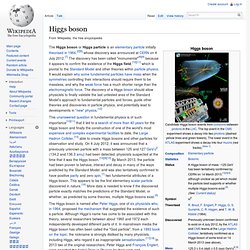

Physicists Find Particle That Could Be the Higgs Boson. What exactly is the Higgs boson?" Particle physics usually has a hard time competing with politics and celebrity gossip for headlines, but the Higgs boson has garnered some serious attention.

That's exactly what happened on July 4, 2012, though, when scientists at CERN announced that they'd found a particle that behaved the way they expect the Higgs boson to behave. Maybe the famed boson's grand and controversial nickname, the "God Particle," has kept media outlets buzzing. Then again, the intriguing possibility that the Higgs boson is responsible for all the mass in the universe rather captures the imagination, too. Or perhaps we're simply excited to learn more about our world, and we know that if the Higgs boson does exist, we'll unravel the mystery a little more. In order to truly understand what the Higgs boson is, however, we need to examine one of the most prominent theories describing the way the cosmos works: the standard model.
Origins: CERN: The Higgs Boson Particle. An oft-cited analogy describes it well: Imagine you're at a Hollywood party.

The crowd is rather thick, and evenly distributed around the room, chatting. When the big star arrives, the people nearest the door gather around her. As she moves through the party, she attracts the people closest to her, and those she moves away from return to their other conversations. By gathering a fawning cluster of people around her, she's gained momentum, an indication of mass. She's harder to slow down than she would be without the crowd. This clustering effect is the Higgs mechanism, postulated by British physicist Peter Higgs in the 1960s.
The question of mass has been an especially puzzling one, and has left the Higgs boson as the single missing piece of the Standard Model yet to be spotted. Electromagnetism describes how particles interact with photons, tiny packets of electromagnetic radiation. The simplest theories predict only one boson, but others say there might be several. Higgs boson. The Higgs boson is named after Peter Higgs, one of six physicists who, in 1964, proposed the mechanism that suggested the existence of such a particle.

Although Higgs's name has come to be associated with this theory, several researchers between about 1960 and 1972 each independently developed different parts of it. In mainstream media the Higgs boson has often been called the "God particle", from a 1993 book on the topic; the nickname is strongly disliked by many physicists, including Higgs, who regard it as inappropriate sensationalism.[17][18] In 2013 two of the original researchers, Peter Higgs and François Englert, were awarded the Nobel Prize in Physics for their work and prediction[19] (Englert's co-researcher Robert Brout had died in 2011). A non-technical summary[edit] "Higgs" terminology[edit] Overview[edit] If this field did exist, this would be a monumental discovery for science and human knowledge, and is expected to open doorways to new knowledge in many fields.
History[edit]